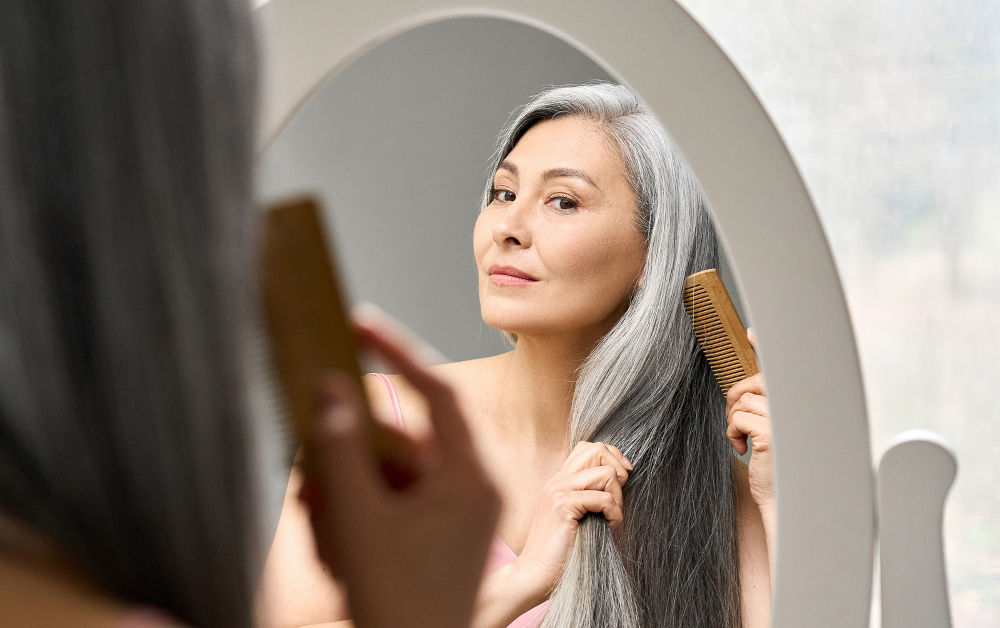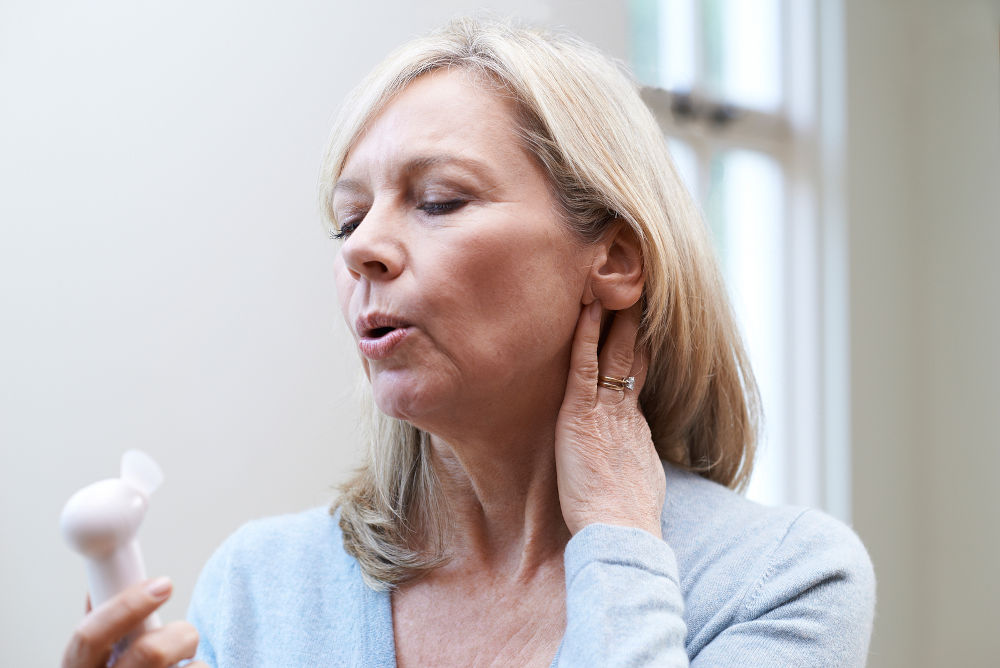
Life is an interesting journey; one moment, you’re a teenager, and the next, you’re dealing with menopause. Usually occurring between the ages of 45 and 55, it’s a process that sees your periods stop due to declining hormone levels, and for many women, it can feel like a challenging phase to navigate – but with the right approach, you don’t have to let it impact your day to day life.
Although many people associate menopause with hot flashes, irritability, and mood swings, not everyone has to deal with these symptoms – and many of those who do may find them minimal. For the few who do find themselves facing a long list of unwanted symptoms, the good news is that there are lots of things you can do to get feeling back to your best sooner, rather than later.
Here are ten simple menopause care tips to help you transition into this phase of life with relative ease.
1. Try hormone therapy (HT)
Hormone replacement therapy is one of the best ways to help your body deal with hormonal imbalances, and involves infusing hormones your body might not be producing into your system to ease the symptoms of menopause and prevent osteoporosis, as well as allowing your day to day standard of life. Although most people will not need HRT, those who suffer from unwanted symptoms may find that it helps and provides some relief. Some of the ways hormone therapy can help include improving vaginal moisture, reducing mood swings, sweating and hot flashes, and minimising the risk of osteoporosis.

2. Talk to your doctor
Even those who don’t experience many of the symptoms commonly associated with menopause may find they benefit from talking to a menopause doctor. During this phase, your body will be experiencing oestrogen loss at this point, and it is especially important to seek guidance from a professional if your family has a history of heart disease, osteoporosis, and other associated fatal conditions, which may be impacted by this. The key is knowing your options in protecting yourself from bone and heart-related conditions, so book an appointment sooner rather than later.
3. Invest in a portable fan
Night sweats and hot flashes are some of the most common signs and symptoms of menopause, and also some of the most unpleasant. At times, you may find you feel sweaty and hot even when in well-ventilated rooms. When you’re at work, or anywhere else you don’t have control of the temperature settings, having a portable fan on hand can be a lifesaver and will keep you cool when you need it the most. As an added bonus, it’s also great for the summer months, and any unpredictable heatwaves.
4. Choose linen and cotton fabrics
Fabrics made of natural fibres are gentle on the skin and make it easier for your skin and body to breathe. Switching to light cotton and linen fabrics, in particular, will go a long way towards helping to manage night sweats and hot flashes, so avoid anything made of synthetic materials including nylon, polyester, acrylic, and spandex – which retain more heat and are less breathable – and opt for the former instead.
5. Wear layers
Layering your clothing is a great way to regulate body temperature without sacrificing comfort. Consider choosing three or more top layers – such as a light blouse, open shirt and jacket, to keep your body warm, especially after a hot flash, when the contrasting air temperature may give you the chills. Wearing layers will also help to absorb any sweat produced in the process.

6. Moisturise and lubricate
Sex can become painful for some women during menopause, and if left unchecked, can have a negative impact on your relationship and your self esteem. However, there’s no need to give up some of these pleasures of life because of menopause, and lubricants and vaginal moisturisers can help to make the experience easier and more enjoyable – just as it was before. Most women in menopause use water-based lubricants to combat vaginal dryness and painful sex. Book an appointment with your doctor to see what options you have, as they may offer you a prescription for oestrogen vaginal cream.
7. Talk to friends
Dealing with the symptoms of menopause can be frustrating and challenging for many women, but taking them on yourself will only make it harder. Talking to friends, especially those going through the same, can help provide some relief, and sharing the challenges everyone is going through and some of the measures they take to combat their own symptoms can be an eye-opener, as well as making you feel that you aren’t alone.
8. Stay hydrated
Make a habit of drinking water to stay hydrated all day long. Cold water is refreshing and will also help keep your body temperature low and manageable. It might also be time to start carrying a water bottle with you whenever heading out or into the office for the day, as staying sufficiently hydrated can go a long way towards combatting most of the symptoms associated with menopause.
Drinking pure water will also help replenish dry skin and tissues and reduce hormonal bloating. At least eight glasses of water per day is a good benchmark to aim for.
9. Take care of yourself
Some foods, smoking, and even alcohol may not be as appealing as they used to during menopause, and can sometimes exacerbate the symptoms – so avoid them or cut down your consumption to stay feeling your best, and your body and mind will both thank you for it. Learning to take care of yourself can help improve your overall well-being, and limiting how much you drink, eating healthily, and quitting the cigarettes can go a long way.
Adopting a simple but healthy lifestyle will make it easier to manage most symptoms of menopause and make your life more comfortable. And don’t forget to introduce some form of regular exercise, which can be a powerful tonic.

Exercises for menopause
Healthy women should be aiming for about 150 minutes of moderate activity or 75 minutes of vigorous aerobic exercise every week. According to the NHS, we should be trying to incorporate two or more days a week of strength exercises, targeting the major muscle groups.
Resistance or strength training
It’s important for women to include some sort of resistance training in their exercise regime because it will help to both maintain and increase muscle mass and deal with any losses that can commonly occur due to menopause.
Resistance training helps the body by burning fat and speeding up metabolism, as well as offering a host of other benefits. A good way to incorporate resistance training into your workouts is by using resistance bands or free weights at the gym – or, if you’re working out from home, try using things like tins of soup or baked beans as weights when doing exercises like squats, bicep curls, lunges, and sit-ups.
Cardio
Aerobic activity is also important for your overall health and fitness. One of the best things about cardio is that you don’t need any equipment to get started. Some good examples include jogging, brisk walking, running, and swimming – even cycling is a good idea. If you feel like you want to take it a notch higher, consider HIIT – especially when you don’t have much time to spend on exercising.
Meditation, yoga, and stretching
Some of the symptoms of menopause can leave you feeling tense and stressed, which makes it a good idea to add some more relaxing exercises like yoga into your routine, too.
Restorative and supportive yoga poses can give your body and mind some relief from tension and also relax the nervous system because by calming your mind, allowing you to fully switch off and relax when you need it the most. Yoga and meditation can both be powerful tools when it comes to helping with menopausal symptoms like irritability, hot flushes, and fatigue.
10. Consider supplements (talk to your doctor first)
Nutritional supplements can help you to manage the symptoms of menopause more effectively and prevent the risk of developing a health condition. Black cohosh and calcium supplements may come in handy, but aren’t for everyone. Talk to your doctor to get some advice on which – if any – supplements you should be taking in order to maintain optimal health throughout.
